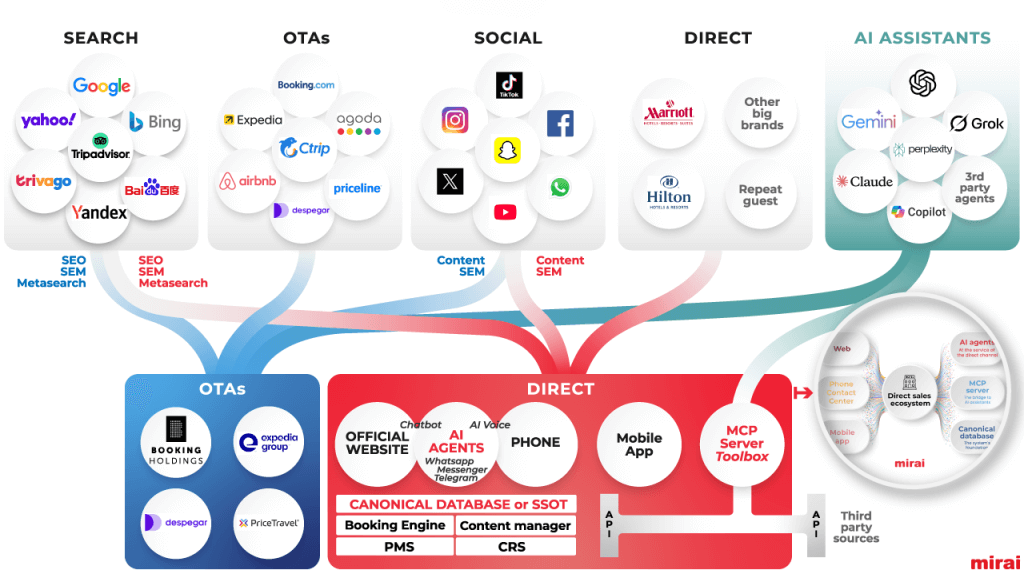
Seasonality is a crucial factor that significantly influences the revenue of hotels.
NB: This is an article from RateGain
In the hospitality industry, demand fluctuates throughout the year due to various factors such as weather, holidays, events, and travel patterns. Understanding and effectively managing the impact of seasonality on hotel revenue is essential for hoteliers to maximize revenue, optimize operations, and deliver exceptional guest experiences.
Subscribe to our weekly newsletter and stay up to date
Let us now explore the key aspects of seasonality and its profound effects on hotel revenue.
The Nature of Seasonality in the Hotel Industry
Seasonality refers to the recurring patterns of high and low demand that hotels experience throughout the year. It is driven by both external factors, such as weather conditions and holidays, and internal factors, including marketing strategies and events hosted by the hotel. Recognizing the cyclical nature of seasonality is the first step towards developing effective revenue management strategies.
Understanding Peak and Off-Peak Seasons
Hotels commonly experience two types of seasons:
- Peak seasons are characterized by high demand, increased occupancy rates, and higher average daily rates (ADR). These periods often coincide with popular travel seasons, holidays, festivals, or local events.
- Off-peak seasons, on the other hand, see lower demand, decreased occupancy rates, and potential rate discounts to attract guests during slower periods.
While peak seasons present new revenue opportunities, off-peak seasons are characterized by the challenges they pose for the revenue managers.
- Revenue Opportunities in Peak Seasons
During peak seasons, hotels have the opportunity to maximize revenue through strategic pricing and yield management. By analyzing historical data, market trends, and booking patterns, hoteliers can adjust room rates dynamically to capitalize on high demand. Additionally, upselling and cross-selling techniques can be employed to enhance revenue by promoting additional services and amenities. - Challenges and Strategies for Off-Peak Seasons
Off-peak seasons present challenges for hotels, as they often experience lower occupancy and reduced revenue. However, smart strategies can help minimize the impact of off-peak periods. This includes:- Running targeted marketing campaigns to attract specific traveler segments
- Offering special promotions or packages
- Partnering with local businesses or event organizers
- Hosting events or conferences to generate demand during slower times
Strategies to Mitigate the Impact of Seasonality on Hotel Revenue
- Forecasting and Data Analytics
Accurate forecasting and data analytics play a crucial role in mitigating the effects of seasonality. Historical data, market insights, and booking trends can be analyzed to anticipate demand fluctuations and adjust pricing and inventory accordingly. Advanced analytics tools and revenue management systems enable hotels to make data-driven decisions and optimize revenue during different seasons. - Embracing Technology and Market Intelligence
To effectively navigate seasonality, hotels must leverage hotel technology and market intelligence. Automated revenue management systems can analyze vast amounts of data in real-time, providing valuable insights into market trends, competitor pricing, and customer preferences. This allows hotels to make timely adjustments, optimize pricing strategies, and stay competitive in the dynamic marketplace. - Enhancing Guest Experiences
During both peak and off-peak seasons, delivering exceptional guest experiences remains paramount. By focusing on personalized service, unique offerings, and tailored experiences, hotels can differentiate themselves and attract loyal customers. Engaging with guests through targeted marketing campaigns, hotel loyalty programs, and post-stay feedback further strengthens relationships and encourages repeat visits.
Seasonality significantly impacts hotel revenue, presenting both challenges and opportunities for hoteliers. By adapting to the ever-changing market dynamics, hotels can achieve sustained success and drive profitability throughout the year.




